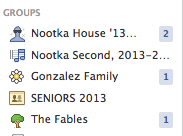A couple of weeks ago, me and a group of ASTU classmates gave a presentation about the construction of personal identity in PostSecret, a website that defines itself as an “on-going community art project”. Following our presentation, the Six-Word Memoir group, in focusing on the website Six Word Memoir, touched upon a subject that had been of great interest to me and my other classmates as we sought to decide the big issue in our presentation: community. Throughout their presentation, we were able to see how the features of the website allowed people to feel part of a larger, all-encompassing community. After the class, I was left wondering: how is it that social platforms, like PostSecret, Six-Word Memoir and Facebook generate a strongly interlinked and bonded community, or, more accurately, “engender a psychological sense of community” (Reich 1)? Do individuals truly derive a warm feeling of belonging and understanding in these seemingly distant, impersonal digital sites?
To explore how Post secret and Six-Word Memoir allow visitors to develop a sense of community, I think that it important to first provide a sound, workable definition for the abstract term “community”. I will be using the definition coined by Sociology and Urban Studies professor Barbara Phillips, whose book my Urban Studies Professor Dr. Elvin Wyly commonly draws from when contextualizing the content of our lectures. Philips sees community as “a group sharing an identity and a culture, typified by a high degree of social cohesion” (Phillips, 2010, p.167). The first part seems at odds with the cyber communities in PostSecret, Facebook and Six-Word Memoir, given that, for the most part, we can safely say that members of these communities generally do not possess exact identities or cultures . Yet, they do seem to exhibit that high degree of social cohesion captured by this definition, for members often do seem to have the sense of emotional connection and integration that I believe are characteristic of communities. In their article, Miller and Shepherd recognized that one of the key “exigences” (Miller and Shepherd 12) , that is, the main rhetorical motives for bloggers (and perhaps visitors of websites like PostSecret and Six-Word Memoir), is the need for “cultivation and validation of the self”(Miller and Shepherd 12). Recognizing this fundamental human need, many website developers including those in PostSecret, Six-Word Memoir and Facebook have provided tools to ensure that, regardless of their background or struggles, people feel included within these communities.
With regards to Facebook, I would argue that perhaps the most visible tools that enable people to feel part of a community are the Facebook Groups and Community groups, seen on the left-hand column in the Home Feed. Looking at my own news feed, you can see the Nootka group, The Fables, (my Jumpstart Learning community) and a family group titled “Gonzalez Family”. In joining these groups, Facebook allows its members to feel connected to, and integrated within, a wider group with similar interests, therefore building a sense of belonging.
Unlike Facebook, however, PostSecret has a separate branch titled PostSecret community, with a small subsection named “PostSecret Chat” where we find several categorized self-help and personal identity groups. As you can see below, the website has distinctive categories such as PostSecret Discussion, PostSecret Internative Community, in which an array of different interests and concerns are catered for by having sections such as Secrets of Mental Health, Spirituality, Soldiers’, LGBTQ, targeted at different individuals. By encouraging visitors to join in and engage with others in a conversation about specific issues, these group forums foster communication, interdependence and thus allow members to build an emotional connection with others in a technological platform. Not only are users able to interact with each other, but in the cases of mental health, they can also seek out information and provide support for other members, often even directly offering to help others in their recovery process. For instance, as I was browsing through one of the mental illness group threads, I noticed that one of the respondents tried to provide support to another participant simultaneously by giving advice and by ensuring them that, if they ever need to talk, they can always “PM” them.
Some argue that the unprecedented success of websites such as Facebook has directly influenced other websites, for in constructing their virtual communities they have “sought to incorporate [Facebook’s architectural features] into many of [their] digital platforms”. Indeed, Six-Word Memoir is a prime example of this appropriation, for (as enlightened by the Six-Word Memoir group presentation) it allows readers to comment on the memoirs and even “like” them. In addition, members are able to share the memoirs they come across with friends in other social-networking sites by virtue of a Share button, thereby enabling individuals to feel immersed within a community and helping to strengthen their social relationships through sustained interaction.
Overall, while Six-Word Memoir, Facebook and PostSecret use starkly different features to create virtual communities, they all fulfill need to belong by allowing membership to “exclusive” groups and inviting people to contribute and express their thoughts within specified parameters. Have you recognized any other distinguishing features in these sites or perhaps other sites that help to build this enigmatic sense of “community”? Is this always a positive community, in the sense that it brings benefits to users, or have you come across sites where this is not the case (e.g. Youtube and Pinterest)?
Reich, S. (2010) Adolescent’s sense of community on Myspace and Facebook: A Mixed-Methods approach. Journal of Community Psychology. Vol. 38, No. 6, 688–705. University of California, Irvine. Published online in Wiley InterScience (www.interscience.wiley.com).
Miller, C. Shepherd, D. Blogging as Social Action: A Genre Analysis of the Weblog. North Carolina State University

